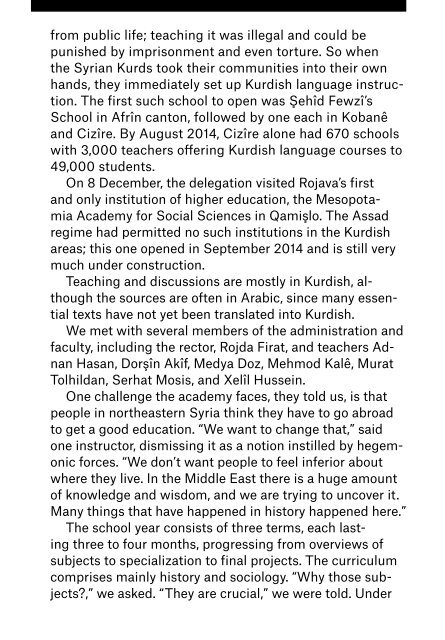Stateless Democracy
NWA5-Stateless-Democracy1.pdf?utm_content=buffer7beda&utm_medium=social&utm_source=twitter
NWA5-Stateless-Democracy1.pdf?utm_content=buffer7beda&utm_medium=social&utm_source=twitter
You also want an ePaper? Increase the reach of your titles
YUMPU automatically turns print PDFs into web optimized ePapers that Google loves.
from public life; teaching it was illegal and could be<br />
punished by imprisonment and even torture. So when<br />
the Syrian Kurds took their communities into their own<br />
hands, they immediately set up Kurdish language instruction.<br />
The first such school to open was Şehîd Fewzî’s<br />
School in Afrîn canton, followed by one each in Kobanê<br />
and Cizîre. By August 2014, Cizîre alone had 670 schools<br />
with 3,000 teachers offering Kurdish language courses to<br />
49,000 students.<br />
On 8 December, the delegation visited Rojava’s first<br />
and only institution of higher education, the Mesopotamia<br />
Academy for Social Sciences in Qamişlo. The Assad<br />
regime had permitted no such institutions in the Kurdish<br />
areas; this one opened in September 2014 and is still very<br />
much under construction.<br />
Teaching and discussions are mostly in Kurdish, although<br />
the sources are often in Arabic, since many essential<br />
texts have not yet been translated into Kurdish.<br />
We met with several members of the administration and<br />
faculty, including the rector, Rojda Firat, and teachers Adnan<br />
Hasan, Dorşîn Akîf, Medya Doz, Mehmod Kalê, Murat<br />
Tolhildan, Serhat Mosis, and Xelîl Hussein.<br />
One challenge the academy faces, they told us, is that<br />
people in northeastern Syria think they have to go abroad<br />
to get a good education. “We want to change that,” said<br />
one instructor, dismissing it as a notion instilled by hegemonic<br />
forces. “We don’t want people to feel inferior about<br />
where they live. In the Middle East there is a huge amount<br />
of knowledge and wisdom, and we are trying to uncover it.<br />
Many things that have happened in history happened here.”<br />
The school year consists of three terms, each lasting<br />
three to four months, progressing from overviews of<br />
subjects to specialization to final projects. The curriculum<br />
comprises mainly history and sociology. “Why those subjects?,”<br />
we asked. “They are crucial,” we were told. Under<br />
the regime, “our existence [as Kurds] was disputed. We are<br />
trying to show that we exist and have made many sacrifices<br />
along the way… We consider ourselves part of history,<br />
subjects of history.” The instruction seeks to “uncover histories<br />
of peoples that have been denied… to create a new<br />
life to overcome the years and centuries of enslavement of<br />
thought that have been imposed on people.” Ultimately its<br />
purpose is “to write a new history.”<br />
The sociology curriculum takes a critical stance toward<br />
twentieth-century positivism and instead seeks to develop<br />
a new, alternative social science for the twenty-first century,<br />
what Abdullah Öcalan calls a “sociology of freedom.” For<br />
their final projects, students choose a particular social problem,<br />
then research it and write a thesis on how to resolve it,<br />
in connection with this alternative. So the learning is practical<br />
as well as intellectual, intended to serve a social good.<br />
Unlike conventional Western approaches, the academy’s<br />
pedagogy rejects the unidirectional transmission of facts.<br />
Indeed it doesn’t strictly separate teachers and students.<br />
Teachers learn from students and vice versa; ideally,<br />
through intersubjective discourse, they come to shared<br />
conclusions. Nor are the instructors necessarily professors;<br />
they are people whose life experience has given them<br />
insights that they can impart. One teacher, for example,<br />
recounts folk tales once a week. “We want teachers to<br />
help us understand the meaning of life,” we were told. “We<br />
focus on giving things meaning, being able to interpret and<br />
comment as well as analyze.”<br />
Students take exams, but those exams don’t measure<br />
knowledge — they’re “more like reminders, like dialogues.”<br />
And teachers themselves are subject to evaluation by<br />
students. “You did not explain this very well,” a student<br />
can say. A teacher who is criticized has to talk out the issue<br />
with the student until they both feel they understand<br />
each other.<br />
214–215


